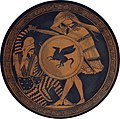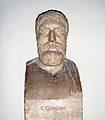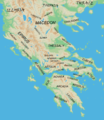Portal:Ancient Greece
The Ancient Greece Portal

Ancient Greece (Ancient Greek: Ἑλλάς, romanized: Hellás) was a northeastern Mediterranean civilisation, existing from the Greek Dark Ages of the 12th–9th centuries BC to the end of classical antiquity (c. 600 AD), that comprised a loose collection of culturally and linguistically related city-states and communities. Prior to the Roman period, most of these regions were officially unified only once under the Kingdom of Macedon from 338 to 323 BC. In Western history, the era of classical antiquity was immediately followed by the Early Middle Ages and the Byzantine period.
Three centuries after the decline of Mycenaean Greece during the Bronze Age collapse, Greek urban poleis began to form in the 8th century BC, ushering in the Archaic period and the colonisation of the Mediterranean Basin. This was followed by the age of Classical Greece, from the Greco-Persian Wars to the death of Alexander the Great in 323 BC, and which included the Golden Age of Athens and the Peloponnesian War. The unification of Greece by Macedon under Philip II and subsequent conquest of the Achaemenid Empire by Alexander the Great spread Hellenistic civilisation across the Middle East. The Hellenistic period is considered to have ended in 30 BC, when the last Hellenistic kingdom, Ptolemaic Egypt, was annexed by the Roman Republic.
Classical Greek culture, especially philosophy, had a powerful influence on ancient Rome, which carried a version of it throughout the Mediterranean and much of Europe. For this reason, Classical Greece is generally considered the cradle of Western civilisation, the seminal culture from which the modern West derives many of its founding archetypes and ideas in politics, philosophy, science, and art. (Full article...)
Selected article -

The Eleusinian Mysteries (Greek: Ἐλευσίνια Μυστήρια, romanized: Eleusínia Mystḗria) were initiations held every year for the cult of Demeter and Persephone based at the Panhellenic Sanctuary of Eleusis in ancient Greece. They are considered the "most famous of the secret religious rites of ancient Greece". Their basis was a Bronze Age agrarian cult, and there is some evidence that they were derived from the religious practices of the Mycenean period. The Mysteries represented the myth of the abduction of Persephone from her mother Demeter by the king of the underworld Hades, in a cycle with three phases: the descent (loss), the search, and the ascent, with the main theme being the ascent (ἄνοδος) of Persephone and the reunion with her mother. It was a major festival during the Hellenic era, and later spread to Rome. Similar religious rites appear in the agricultural societies of the Near East and in Minoan Crete.
The rites, ceremonies, and beliefs were kept secret and consistently preserved from antiquity. For the initiated, the rebirth of Persephone symbolized the eternity of life which flows from generation to generation, and they believed that they would have a reward in the afterlife. There are many paintings and pieces of pottery that depict various aspects of the Mysteries. Since the Mysteries involved visions and conjuring of an afterlife, some scholars believe that the power and longevity of the Eleusinian Mysteries, a consistent set of rites, ceremonies and experiences that spanned two millennia, came from psychedelic drugs [disputed – discuss]. The name of the town, Eleusis, seems to be pre-Greek, and is likely a counterpart with Elysium and the goddess Eileithyia. (Full article...)
Selected location -

Olympia (Modern Greek: Ολυμπία [oli(m)ˈbi.a]; Ancient Greek: Ὀλυμπία [olympí.aː]), officially Archaia Olympia (Greek: Αρχαία Ολυμπία lit. 'Ancient Olympia'), is a small town in Elis on the Peloponnese peninsula in Greece, famous for the nearby archaeological site of the same name. The site was a major Panhellenic religious sanctuary of ancient Greece, where the ancient Olympic Games were held every four years throughout Classical antiquity, from the 8th century BC to the 4th century AD. They were restored on a global basis in 1894 in honor of the ideal of peaceful international contention for excellence.
The sacred precinct, named the Altis, was primarily dedicated to Zeus, although other gods were worshipped there. The games conducted in his name drew visitors from all over the Greek world as one of a group of such "Panhellenic" centres, which helped to build the identity of the ancient Greeks as a nation. Despite the name, it is nowhere near Mount Olympus in northern Greece, where the Twelve Olympians, the major deities of Ancient Greek religion, were believed to live. (Full article...)
Did you know...
- ... that the Greeks did not have a term for "religion"?
- ... that Ancient Greek cuisine was characterized by its frugality, reflecting agricultural hardship?
- ... that the economy of ancient Greece was characterized by the extreme importance of agriculture, all the more so because of the relative poverty of Greece's soil?
Related portals
Selected biography -
Aristarchus of Samos (/ˌærəˈstɑːrkəs/; Ancient Greek: Ἀρίσταρχος ὁ Σάμιος, Aristarkhos ho Samios; c. 310 – c. 230 BC) was an ancient Greek astronomer and mathematician who presented the first known heliocentric model that placed the Sun at the center of the universe, with the Earth revolving around the Sun once a year and rotating about its axis once a day. He also supported the theory of Anaxagoras according to which the Sun was just another star.
He likely moved to Alexandria, and he was a student of Strato of Lampsacus, who later became the third head of the Peripatetic School in Greece. According to Ptolemy, he observed the summer solstice of 280 BC. Along with his contributions to the heliocentric model, as reported by Vitruvius, he created two separate sundials: one that is a flat disc; and one hemispherical. (Full article...)
General images -
Selected picture

Photo credit:Badseed
The Panathinaiko or Panathenaic Stadium, also known as the Kallimarmaro (Καλλιμάρμαρο, i.e. the "beautifully marbled") in Athens is the only major stadium in the world built entirely of white marble (from Mount Penteli).
Topics
Life: Agriculture · Art · Cuisine · Democracy · Economy · Language · Law · Medicine · Paideia · Pederasty · Pottery · Prostitution · Slavery · Technology · Olympic Games
Philosophers: Pythagoras · Heraclitus · Parmenides · Protagoras · Empedocles · Democritus · Socrates · Plato · Aristotle · Zeno · Epicurus
Authors: Homer · Hesiod · Pindar · Sappho · Aeschylus · Sophocles · Euripides · Aristophanes · Menander · Herodotus · Thucydides · Xenophon · Plutarch · Lucian · Polybius · Aesop
Buildings: Parthenon · Temple of Artemis · Acropolis · Ancient Agora · Arch of Hadrian · Temple of Zeus at Olympia · Colossus of Rhodes · Temple of Hephaestus · Samothrace temple complex
Chronology: Aegean civilization · Minoan Civilization · Mycenaean civilization · Greek dark ages · Classical Greece · Hellenistic Greece · Roman Greece
People of Note: Alexander The Great · Lycurgus · Pericles · Alcibiades · Demosthenes · Themistocles · Archimedes · Hippocrates
Art and Sculpture: Kouroi · Korai · Kritios Boy · Doryphoros · Statue of Zeus · Discobolos · Aphrodite of Knidos · Laocoön · Phidias · Euphronios · Polykleitos · Myron · Parthenon Frieze · Praxiteles
Subcategories
Things to do
 |
Here are some tasks awaiting attention:
|
Associated Wikimedia
The following Wikimedia Foundation sister projects provide more on this subject:
-
Commons
Free media repository -
Wikibooks
Free textbooks and manuals -
Wikidata
Free knowledge base -
Wikinews
Free-content news -
Wikiquote
Collection of quotations -
Wikisource
Free-content library -
Wikiversity
Free learning tools -
Wiktionary
Dictionary and thesaurus























































